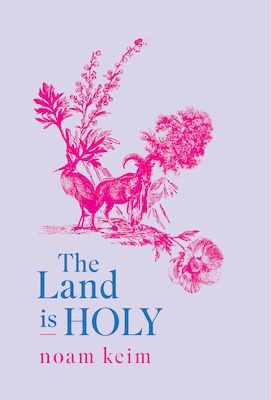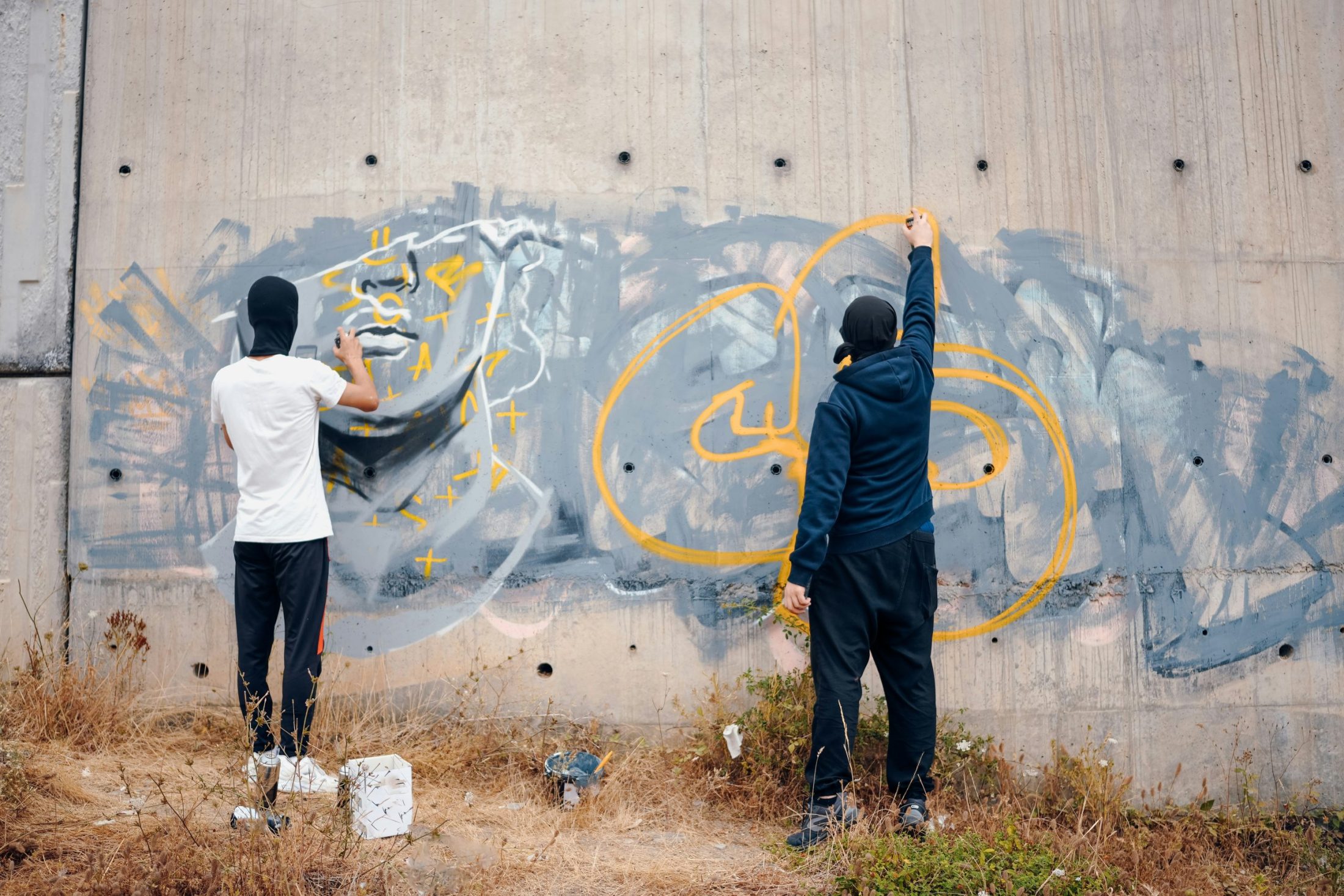Early in noam keim’s debut collection of lyrical nonfiction, The Land is Holy, they awake panicked from a dream where they are running away from disaster, carrying only what is in their pack. They realize they have been called to do ancestral work, to unearth their family’s lineages, even as they are now estranged and in exile. “I have lost my way from home,” they write, “And I am trying to learn which way it is again.”

How does one heal from trauma, both personal and ancestral? What stories do we get to hear? Which ones aren’t ours to share? These are among the many questions keim asks in The Land is Holy. A queer Arab Jew, born into a settler family in occupied Palestine, keim explores their personal and ancestral past as well as what it means to build a home in an often inhospitable world. Taking joy in blooming lindens, cactus fruit, the migration of the stork, and other aspects of the natural world, even as the climate is collapsing, keim reminds us how nature itself can be restorative and can provide a shift, “a release of sorts.”
Winner of the 2022 Megaphone Prize by Radix Printing and Publishing Cooperative, judged by Hanif Abdurraqib, Keim’s collection explores finding freedom despite imprisonment, finding one’s identity outside of binaries, finding healing through nature. “We will win freedom for all, in the shape of forests of trees…in the fields of green leaves…We will win freedom for all, and erect structures of connection. Together, after all.”
A trauma worker, medicine maker, and flaneur freak, keim has been awarded numerous fellowships and awards. We met last year at the Sewanee Writers Conference, where they astounded me with their reading from a different work. We spoke recently by phone, and followed up with questions by email. We discussed rooting one’s writing in nature, the freedom found in estrangement, and how walking influences their writing practice.
Deirdre Sugiuchi: You introduce yourself in the opening chapter saying “I was born on Christmas Day in the desert of Palestine, the settler child of Fernand and Hassida…” Can you explain what a settler is? How has this identity shaped you and given you perspective on the current destruction taking place in Gaza?
noam keim: A foundational truth about my life is that I would not have been born without the existence of Zionism: my parents met in the Zionist State where they both lived at the time, even though this wasn’t their ancestral land. My family made a life on a land that was violently taken away from other people: that’s what being a settler means.
My father was raised in France, the son of Holocaust survivors, and my mother was born in the Zionist state from Moroccan parents. I grew up in France, as we moved when I was a baby, and every summer when I’d go back there, I would experience the whiplash of the Zionist society. I have believed in Palestinian freedom and self-determination for as long as I remember (even though my politics refined themselves over time), and as someone whose family shaped the violence inflicted on people indigenous to the land, it means a responsibility. A responsibility to write this book, to engage with the violence of my lineage without shying away from its truths.
As we enter almost a year of genocide in Gaza, my internal landscape has shifted: I am angry, I am devastated and I am clearer than ever that we will see a free Palestine in this lifetime.
DS: What first attracted me to your writing is how you address the collision of climate collapse and ancestral trauma. Can you discuss this, your call to do ancestral work, and how you see our (collective) ancestors’ actions impacting our present-day environment?
My family made a life on a land that was violently taken away from other people: that’s what being a settler means.
nk: I started writing The Land is Holy in late 2021, at a time when I was experiencing deep grief, from my job working with people impacted by the carceral state, from the pandemic, and from living on Turtle Island. We were experiencing floods in the city where I live, and I was watching our accelerating climate apocalypse feeling hopeless. My body kept telling me to run away, and, as the grandchild of Holocaust survivors, and the grandchild of people who survived internment camps, I am deeply aware of the ways my own DNA has been shaped by the trauma of my ancestors. I felt the need to go back, uncover their stories, as a way of making sense of what was unraveling in my own body. I needed to ground myself in the past to start seeing sparks of hope for the future: my people have survived apocalypses before, so, I can too.
By rooting myself in plants, animals, and the natural elements of my ancestral lineage, I was able to heal a lot of the wounds I was carrying, and to start imagining a life of joy and abundance, even in a time of deep loss and destruction.
DS: How does bird-watching, and other forms of paying attention to nature, shape your writing?
nk: I spend a lot of time playing with the metaphor in my head, and the book is organized in 15 essays that each examine some kind of natural element to make sense of my own experiences. The book deals with heavy subjects: sexual assault, interpersonal violence, prison, genocide.
Thinking about ideas and memories through metaphor allows me to access feelings that are not always readily available to me. Focusing on the small, on the detail of a bird, a leaf, a water source, makes it easier for me to tell stories that I would otherwise keep secret.
Being around trees and flowers and birds also takes me out of my own ego: there is a vast world that existed before me and that will continue to blossom after my time on this plane. It allows me to write about my own trauma, without (hopefully) falling into the trap of navel gazing.
DS: I love lyrical memoirs, and I love your writing, but part of the attraction for me in reading this book was to further my understanding of the creation of Israel and the ensuing conflict in Palestine When you write about your grandparents’ migration from Morocco to Israel, you say “They were both part of a moment in history when Arab Jews were manipulated to leave their homelands and populate the lower echelons of the Zionist State and justify the rejection of Arabness as a whole.” Can you elaborate?
nk: Let me start by naming clearly that I am an Arab Jew, whose people came from one of the largest Jewish communities in North Africa. There used to be 300,000 Jewish people living in Morocco and their influence on Moroccan identity is palpable in every corner of the country. Most Jewish people left, including my grandparents.
When the Zionist State was built, it simply did not have enough bodies to sustain itself: the European Jews who were the architects of the State needed to build a critical mass in order to fully settle the land. This is when the idea came to bring in the Arab Jews, from Moroccan, Yemen, Syria, Iraq, via propaganda or fabricated antisemitic violence (look up the bombing of the Baghdad synagogue). Once they migrated, they were put first in ma’abarot, transit reeducation camps before being relocated to the less desirable parts of the country, including the “buffer zones” with historical Palestinian communities. There’s many great resources to learn more about it, including Ella Shohat scholarship on Mizrahi Jews (Jews from the Orient) and their place in the racist nation in which they live. Emily Benichou Gottreich wrote some excellent books on the history of Jewish people in Morocco but I am partial to Aomar Boum’s book Memories of Absence: How Muslims Remember Jews in Morocco.
In my childhood home, using the term Arab to describe ourselves was not allowed, even though this was how we were read everywhere in the French city I grew up in. We also did not learn darija, Moroccan Arabic, which was the language my grandparents used daily to converse amongst themselves. Worse, I did not learn about the ma’abarot until I was an adult, sitting with my grandmother late at night.
I am not an academic or a historian of the Zionist State, and I don’t intend my book to be didactic. However, I wanted to tell stories that allowed American readers to understand a reality that is often described as “too complex” from the lens of personal archives of someone instead of scholarship.
DS: One of the threads of this book addresses your estrangement from your parents, particularly from your mother, who was violent. “I don’t think you ever move on from leaving a life behind,” you write, but at the same time, you also note how, by leaving your life, you have the freedom to become who you are, and even to embrace your trans identity. Can you expand upon the freedom gained by leaving/ setting boundaries?
nk: I am a strong believer of holding multiple complex and often contradictory truths at once and my relationship to freedom is very much centered around diverging and equally important realities: I regret moving to the United States and I would not have built a life for myself without going into exile. To be honest, everybody I know who is in exile shares that sentiment. I have gained incredible freedom and have been able to heal so much of my childhood wounds and I would do anything to be able to settle back into a version of my old Parisian life.
I grew up in a very violent household, a violence enacted by both my parents. It wounded me, deeply. When I became estranged from my family, I felt deep shame. There’s something monstrous about having to walk away from caretakers who could not love you and raise you and I believed it pointed to all the ways I was broken.
Part of the project of The Land is Holy was for me to examine “What does it mean to be free?” and for me to reckon with the sacrifices that personal freedom requires. I also wanted to question how much my personal freedom was rooted in my commitment to collective liberation. I wanted to release the shame of walking away.
I am now in community with a lot of people for whom estrangement was the only path forward and I am grateful for every single brave one who decided to walk away.
DS: I feel like so much of my writing practice is influenced by walking. Can you discuss the impact that walking has on your writing practice?
nk: Hmmm, I could write an entire book dedicated to walking (I kinda did), but I am a compulsive walker.
I grew up on a pedestrian street and spent my childhood walking everywhere. As an adult, I have refused to learn how to drive and I am terrified of two-wheelers, so I walk and take public transportation (and get driven by my kind kind friends). The pace of walking is important to me, and I think is reflected in my writing: it’s slower, more attuned to the details, more permeable to what is around.
I often develop my thoughts during my daily 90-minute walk. I’ll take an idea I am trying to develop for myself, and ruminate. It’s very meditative for me and my writing is really impacted by the way the idea unfolds at the pace of my feet.
Read the original article here
